Ready to learn more?
Get all the details straight to your inbox!
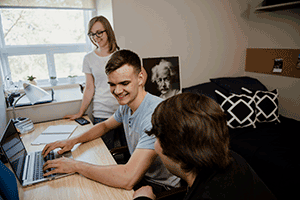
Wondering where to live? Our student residence, The Student Village at Luther College, is considered a great choice for first-year student accommodation. Individual private rooms mean you can stick to your own schedule and you never have to deal with roommate hassles.
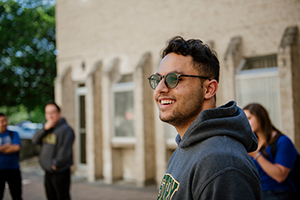
Every degree program at Luther College offers a study abroad option and an optional experiential learning component where you gain real world experience and get paid while going to school!
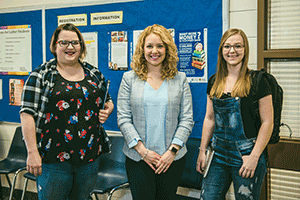
The priority deadline for academic application is March 15. To book a personalized enrolment counselling appointment, contact our Recruitment Office at 1-306-206-2117.
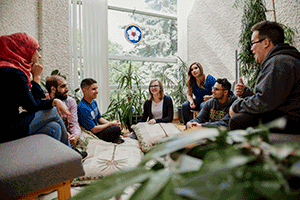
Luther College appeals to students who want to study in a safe, nurturing, and inclusive environment. We welcome students of all faiths, ethnicities, backgrounds, religions, genders, and sexual orientations.
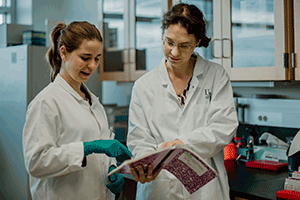
Luther College offers Bundles programs that group together first-year students and classes to give you a great start and help ease the transition from high school to university.
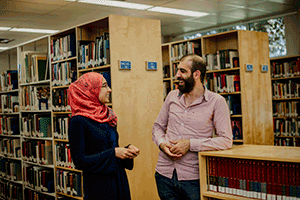
The Luther Library has over 24,000 items in its collection, 5,000 books checked out per year, and 7,000 students who come through its door per month.
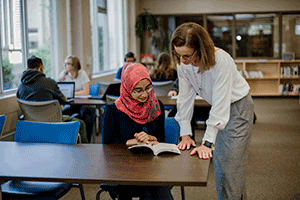
Luther College is recognized for its high standards of teaching, focused research, and one-on-one academic advising. We value and protect this heritage of excellence in scholarship, freedom of inquiry, and faithful seeking after truth.

Smaller class sizes at Luther College means more individualized attention and better connections with your professors, classmates, and academic advisors.
Get all the details straight to your inbox!
By Steven Clow*
Introduction
 The university-bound student-body has seen two developments which have had a palpable impact on the institution of post-secondary education. First is the widening gap between what incoming students and faculty understand as the students’ role in their own education.[1] This includes questions of what is an acceptable work load, how much time students should spend studying outside of the classroom, and what level of independence students ought to maintain as learners. The gap between student and faculty expectations is compounded by the second reality that there is a greater diversity of students pursuing post-secondary education than ever before.[2] This diversity includes mature students, disadvantaged students, international students, Indigenous students, working students, first-generation students, and other non-traditional students.[3] Gone are the days when only the highest-achieving secondary students pursued post-secondary study with both the cultural capital and academic skills needed to be successful. To complicate matters even further, a bachelor’s degree is now a near universal requirement for success in the workforce, turning post-secondary education into a “box-to-be-checked”, so that the student may eventually realize a satisfactory career.[4]
The university-bound student-body has seen two developments which have had a palpable impact on the institution of post-secondary education. First is the widening gap between what incoming students and faculty understand as the students’ role in their own education.[1] This includes questions of what is an acceptable work load, how much time students should spend studying outside of the classroom, and what level of independence students ought to maintain as learners. The gap between student and faculty expectations is compounded by the second reality that there is a greater diversity of students pursuing post-secondary education than ever before.[2] This diversity includes mature students, disadvantaged students, international students, Indigenous students, working students, first-generation students, and other non-traditional students.[3] Gone are the days when only the highest-achieving secondary students pursued post-secondary study with both the cultural capital and academic skills needed to be successful. To complicate matters even further, a bachelor’s degree is now a near universal requirement for success in the workforce, turning post-secondary education into a “box-to-be-checked”, so that the student may eventually realize a satisfactory career.[4]
On the surface, the complications presented above seem to paint a grim portrait of the present and the future of post-secondary education. In fact, they present great potentials as well. With a greater diversity of students attending post-secondary institutions than ever before, there is an opportunity for the largest and most diverse group of young adults yet to become educated, conscientious, critical thinkers. I would argue that it is part of a post-secondary institution’s responsibilities to try to adapt to this new student body and convey the benefits of post-secondary study to as many as it can.[5] As Smith et al. have put it: “Higher education, whose historic raison d’etre has been to cast an empirical and critical eye on everything else in the world, is now moving (or being forced to move) to cast a critical eye upon itself.”[6] As post-secondary institutions rise to this new challenge, a variety of programming approaches have been developed. Two initiatives that have been proven especially effective at increasing the skill sets of students as well as introducing them to life as a post-secondary student, are foundations programmes and learning communities.[7] In designing and implementing its own foundations programme, I would argue that Luther College can take the opportunity to improve the quality of the education provided to its students.
In February 2016 I was hired by Luther College to help its faculty and staff understand the rationale and workings of foundations programmes better. I was also tasked with investigating existing foundations programmes around Canada and internationally, and proposing an outline for Luther College’s own version of it. I was quite excited about being afforded this opportunity, given my background in researching post-secondary skills, my own extensive experience as a university student, and my passion for education in general.
Research for this project was extensive. I prepared a review of literature focusing on the student transition into university study, examined the skills new students need to succeed at university study, and researched foundations programmes themselves. Interviews with programme coordinators and directors from existing foundations programmes across Canada and in the United States as well as with Luther College faculty and staff were also conducted. Perhaps the most important takeaway from all of this research is the following: foundations programmes and learning communities are not attempts at remedial education, but rather intentional and explicit efforts to model university-level learning as early in the students’ academic careers as is possible.
Background
As discussed above, post-secondary institutions around the world are engaging in a wide variety of programming and curricular initiatives in order to both surmount the issues and take advantage of the opportunities. Foundations programmes and learning communities are the two initiatives in which Luther College is most interested. Since it is not entirely clear where one programme begins and the other ends, I will clarify certain terms associated with both first, before using them throughout this article.
Foundations programmes are developed with the goal of providing students with the skills, tools, and supports needed to succeed in university study. Foundations programmes are typically a full year in length, though many institutions opt to run their programme through only the first semester. Foundations programmes also cover a host of topics in general and attempt to introduce students to cross-disciplinary and critical thinking, while simultaneously providing opportunities for students to hone their academic skills.
Learning communities should be viewed as the structure or set of practices which a foundations programme might use to achieve its goals. Smith et al. define learning communities as “a variety of curricular approaches that intentionally link or cluster two or more courses, often around an interdisciplinary theme or problem, and enroll a common cohort of students.”[8] Learning communities are becoming increasingly popular among post-secondary institutions: three out of six operational programmes interviewed for this project identified learning communities within their programmes. Moreover, research shows them to be an effective strategy for addressing the issues outlined in the introduction.
Carefully designed and implemented learning communities can simultaneously address the issues of enhancing student learning and building the quality of our academic communities in a cost-effective manner. Because they can provide a holistic and coherent approach to reform, learning communities offer a potentially more sustainable approach than many more narrowly based reform initiatives.[9]
Importantly, neither foundations programmes nor learning communities aim to lower university standards in an effort to accommodate a new kind of student who lacks the skills required to succeed at university study. Instead, these two approaches to programming are employed to introduce incoming students to the standard of learning expected at university. As was pointed out to me by many Luther College faculty and staff members, as well as by programme coordinators from foundations programmes across the country, incoming students simply do not know how unprepared they are for university study. In fact, they are often surprised at the lower than expected marks they receive. Programmes like the ones explored in this article are designed to introduce students to post-secondary study and to prepare them for the work ahead.
I found that Luther College’s goals are most in line with those of a foundations programme, i.e. introducing students to university study and encouraging opportunities for them to hone the skills required for success both inside and outside of the classroom. The term “foundations programme” will, therefore, be used throughout this article to refer to Luther College’s proposed programme. “Learning communities” will be used as required by either the literature reviewed or in discussion with currently existing programmes within Canada and the United States.
Skills in University Study
The most obvious requirement for success in university study are skills, specifically academic skills students will utilize in university (reading, writing, researching, critical-thinking, etc.) as well as the “soft” or “life” skills that employers and parents, especially, are asking for their bachelor degree-carrying employees and children to possess. Soft skills include communication, teamwork, collaboration, and problem-solving.[10] I would argue that Luther College’s foundations programme should take advantage of the opportunity to be specific about the skills incoming students could gain from participation in the programme as well as how the students would be able to apply them to the rest of their university experience – not to mention their life and employment after school. The Ontario Ministry of Advanced Education and Skills Development calls these “Essential Employability Skills” and has created a handy resource that breaks these skills down further into defining skills and related learning outcomes.
Specific Skills Needed for Success in Post-Secondary Study
The following list provides a scholarly consensus of skills that students need in order to succeed in their university study. It was derived from literature on the subject of the transition to post-secondary study, skills and practices of successful post-secondary students, and learning communities and foundations programmes:
In addition to acquiring many of the skills from the list above, there is also a crucial need for students to become independent learners who are capable of making their own connections and contributing to their own education.[20] It is important to note that, even though the students’ transition to independent learners and attainment of interpersonal and team work skills may seem at odds, they can, in fact, work very powerfully together. Alan Booth notes that an emphasis on group work and discussion encourages both independent learning and interpersonal skills as the typical role of the instructor is reduced.[21] Booth also reminds us that “greater independence in learning should not be confused with greater individualism.”[22]
Luther College Specifics
Luther College faculty and staff also shared their opinions with me regarding skills that they believe to be important to a university student’s success, including some unique ideas of their own:[23]
Luther faculty and staff see deficiencies amongst incoming students in every skill mentioned above. In particular, student weakness in academic reading, writing and researching, in critical thinking, and in time-management skills were identified.[24] Luther staff also cited decision-making, organizational, and time-management skills as being particularly important to an incoming student.[25]
Solutions from Existing Programmes
Personal interviews with foundations programme coordinators across Canada has provided some strategies to combat these issues. The Programme Coordinator for Saint Mary University’s LEAP Programme, Leigh Gillis, shared a time-management tool she uses with her students with me.[26] As part of the programme, LEAP students take part in weekly LEAP 1000 Workshops. In the second week’s workshop, LEAP students are required to bring all their course syllabi for the semester and are provided with a calendar on which they are to map out their assignments, papers, and tests for the next four-months. The goal of this exercise is to show LEAP students how important it is to plan ahead and manage their time appropriately. Ms. Gillis commented that when the calendar mapping is complete, the students are truly surprised at the amount of work that will be required of them in the upcoming semester. To that end, Ms. Gillis has her LEAP students re-evaluate their calendars around mid-terms.
In order to improve students’ academic reading and critical-thinking skills, the University of Northern British Columbia’s (UNBC) Integrated Analytical Skills and Knowledge (IASK) programme links a skills-based course to two substantive courses taken in the same semester.[27] The skills-based course uses the readings from the substantive courses to teach students to read materials for scholarship and to make their own connections within the material. This advances IASK’s goal of introducing incoming students to the idea that the difference between secondary and post-secondary study is that the students, and professors, are involved in a larger, scholarly conversation.
IASK also makes good use of the different services available to UNBC students. Programme Coordinator, Dr. Tracy Summerville, noted that the IASK programme very intentionally incorporates various services, such as the UNBC Library, into the programme. She explained that representatives from various campus services do not simply come to class and tell the students where their offices are, but come in and workshop with the students. Dr. Summerville specifically noted that a librarian is present throughout the entirety of the skills-based courses.
Solutions offered by Luther College Faculty members[28]
Luther College faculty members were creative in proposing solutions to some of the skill-related issues they are noticing on campus. Many Luther professors reported the use of modeling in the classroom in order to more intentionally show new students what university-level work looks like and requires. Luther faculty members also provide models for a wide range of assignments including annotated bibliographies, paper proposals, research papers, bibliographies, and even exam writing. Some professors spend class time on introducing skills to their students. Modules they have developed include self-directed learning, time-management, professional communication, and research skills. Some faculty members also shared that they no longer take for granted that students will come to university with a certain set of skills; they find it necessary to explain things they would have expected students to know even five years ago. Moreover, faculty members at Luther College encourage the development of interpersonal and collaborative skills through various forms of group work.
The value of ongoing initiatives at Luther College was also commented on, specifically Luther’s Writing Across the Disciplines (WAD) programme which promotes a hands-on and skills-based approach. One faculty member noted that WAD is a systematic and honest approach to skill development in students. Faculty and staff members also highlighted the work of the Luther Library staff both in the library and the classroom. The library is an ideal place to work on student skills-sets and, therefore, belongs into a foundations programme. Luther College’s Bundles and Bundles Plus programmes were also mentioned during faculty and staff interviews. In particular, the Pre-Journalism and Justice & Pre-Law Bundle Plus options were singled out for the professors’ attempts to take an integrative approach to teaching, inviting, for example, guest speakers into the courses. Luther College’s recently revamped UPREP programme was also highlighted as an initiative undertaken by the college to better prepare incoming students. Finally, Luther College’s Voluntary Sector Studies Network (VSSN) was brought up by one faculty member as a practical way to allow students to both work on their interpersonal skills and gain real-world experience. Overall, Luther College’s faculty and staff members believe that all five of these existing initiatives and services could be integrated into a foundations-type programme to great effect.
Building the Programme at Luther College
Linking together two courses is the best way to encourage students to develop critical and cross-disciplinary thinking.[29] In Luther College’s case, existing courses should be utilized as much as possible, for obvious fiscal and practical reasons. The following could form the basis of an effective model:
Students participating in the foundations programme could then choose to fill the rest of their credit hours for the semester at their own discretion.
When designing a programme such as this, it is important to keep in mind its attractiveness to incoming students. To this end, the courses recommended below are always informed by the following tenets: that the programme not add extra costs for the students who participate in it; that the courses that comprise the programme bear regular credit for the students; and that the courses contribute to the students’ degree requirements.
1) Potential Linked Courses
2) Potential Cohort Enrolled Classes
3) “Integrated Hour” or Seminar Course
Conclusion
Some very difficult issues continue to plague many post-secondary institutions, and I would argue that Luther College is not immune to this. Literature – and faculty and staff at Luther College – are in agreement that students are entering university less and less prepared for the work ahead of them, and that something needs to be done. Fortunately, solutions to these issues already do exist and are operating in post-secondary institutions around the world. Foundations programmes structured around learning communities have proven to be effective at addressing the student skills gap, engaging them in campus life, and introducing them to the new responsibilities they will inherit as learners in the university setting. Though facing budgetary restrictions, Luther College is, in my opinion, in an ideal position for developing a foundations programme. Given its small size and tight-knit organization, Luther College can take advantage of existing courses, initiatives, and services to collectively address the issues that all faculty and staff have identified. As the foundations programme develops over time and successes and failures are had, Luther College faculty and staff would hopefully be afforded the opportunity to become even more creative in delivering its programme. There is no question in my mind that, in the end, engagement in a foundations programme will benefit everybody involved, increasing the quality of education for the students, inspiring collaboration and community amongst colleagues, and enhancing the overall mission and profile of Luther College.
Bibliography
Social Transition
Briggs, A.R.J., Clark, J., and Hall, I. “Building bridges: understanding student transition to university.” Quality in Higher Education 18, no. 1 (January 2012): 3-21.
Lesse, Maggie. “Bridging the gap: supporting student transitions into higher education.” The Journal of Further and Higher Education 34, no. 2 (2010): 239-251.
Scanlon, Dr. Lesley, Rowling, Louise, and Weber, Zita. “’You don’t have an identity…you are just lost in a crowd’: Forming a Student Identity in the First-year Transition to University.” The Journal of Youth Studies 10, no. 2 (2007): 223-241.
Skills for Successful Transition
Christie, Hazel, Tett, Lyn, Cree, Viviene E., McCune, Velda. “’It all just clicked’: a longitudinal perspective on transitions within university.” Studies in Higher Education 41, no. 3 (2016): 478-490.
Richardson, Amanda, King, Sharron, Garrett, Robyne, and Wrench, Alison. “Thriving or just surviving? Exploring student strategies for a smoother transition to university. A Practice Report.” The International Journal of the First Year in Higher Education 3, no. 2 (August 2012): 87-93.
Vasalampi, Kati, Nurmi, Jari-Erik, Jokisaari, Markku, Salmela-Aro, Katariina. “The role of goal-related autonomous motivation, effort and progress in the transition to university.” European Journal of Psychology of Education 27, no. 4 (December 2012): 591-604.
Wintre, Maxine G., Knoll, G. M., Pancer, S. M., Pratt, M. W., Polivy, J., Birnie-Lefcovitch, S., and Adams, Gerald R. “The Transition to University: The Student-University Match (SUM) Questionnaire.” Journal of Adolescent Research 23, no. 6 (November 2008): 745-769.
Case Studies and Models
Adam, Andrea, Hartigan, Cathy, Brown, Natalie. “The value of an open, early academic development programme to students’ transition and first year experience: The UTAS Unistart programme.” The International Journal of the First Year in Higher Education 1, no. 1 (July, 2010): 43-54.
Booth, Alan. “Developing History Students’ Skills in the Transition to University.” Teaching in Higher Education 6, no. 4 (2001): 487-503.
Goldman, Corey A. “A Cohort-based Learning Community Enhances Academic Success and Satisfaction with University Experience for First-Year Students.” The Canadian Journal for the Scholarship of Teaching and Learning 3, no. 2 (2012): Article 3.
Lefroy, Anne, Wojcieszek, Janine, MacPherson, Leigh, Lake, Kiri. “UniEdge: A first year transition programme and its continued evolution through a reflective approach. A Practice Report.” The International Journal of the First Year in Higher Education 5, no. 1 (March 2014): 107-116.
Smith, Barbara Leigh, MacGregor, Jean, Matthews, Roberta S., Gabelnick, Faith. Learning Communities: Reforming Undergraduate Education. San Francisco: Jossey-Bass, 2004.
Interviews
Gillis, Leigh. Programme Coordinator of LEAP (Learning, Engagement, Achievement and Peer Mentors) at Saint Mary University, Halifax, NS. Interview by Steven Clow, July 13, 2016.
Faculty and Staff Members at Luther College, University of Regina, Saskatchewan, Canada. Interviews by Steven Clow, conducted throughout July and August 2016.
Summerville, Tracy, Ph.D. Programme Coordinator of IASK (Integrated, Analytical Skills and Knowledge) at the University of Northern British Columbia, Prince George, BC. Interview by Steven Clow, June 29, 2016.
*Steven Clow received his Master of Arts degree in history in 2013. He continued his passion for education as a Special Projects Researcher for George Brown College in Toronto, Ontario. This role included auditing the college’s programmes and courses for the presence of information management skills, sustainability, and soft skills. Returning to Regina in 2015, he entered the University of Regina’s Faculty of Education as an after-degree student with the goal of teaching Social Studies and English Language Arts in the high school setting. Steven Clow’s ultimate objective is to apply what he learned while carrying out research for both George Brown College and Luther College to his eventual work as a high school teacher.
Steven Clow also works as a writing tutor for the University of Regina’s Student Success Centre.
[1] Briggs, et al., 5; Scanlon, et al., 229-31; Smith, et al., 7.
[2] Briggs, et al., 5-6; Scanlon, et al. 225; Smith, et al., 5-6.
[3] Briggs, et al., 5.
[4] Smith, et al., 4.
[5] Lesse, 247; Lefroy, et al., 108.
[6] Smith, et al., 225.
[7] Smith, et al., 19-20; Goldman, 1.
[8] Smith, et al., 20.
[9] Ibid., 19-20.
[10] Ibid., 7.
[11] Richardson, et al., 89-90, 91-92.
[12] Richardson, et al., 92.
[13] Richardson, et al., 91; Adam, et al., 48.
[14] Richardson, et al., 91.
[15] Richardson, et al., 91; Adam, et al., 48.
[16] Vasalampi, et al., 592-93, 601.
[17] Christie, et al., 483-84; Booth, 489; Adam, et al., 48.
[18] Christie, et al., 484-86; Booth, 489; Adam, et al., 48.
[19] Christie, et al., 486-87.
[20] Briggs, et al., 6-7, 12-13; Christie, et al., 483; Booth, 489-90.
[21] Booth, 493-94.
[22] Ibid., 500.
[23] Luther College Faculty and Staff Members, interviews by Steven Clow, conducted throughout August 2016.
[24] Ibid.
[25] Ibid.
[26] Leigh Gillis, interview by Steven Clow, July 13, 2016.
[27] Dr. Tracy Summerville, interview by Steven Clow, June 29, 2016.
[28] Interviews with Luther College Faculty members were carried out by Steven Clow in summer 2016.
[29] Christie, et al., 484-6; Booth, 489; Smith, et al., 235-37.
[30] Smith, et al., 83.